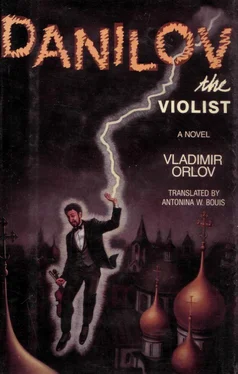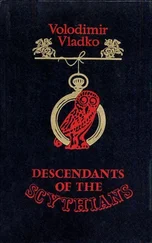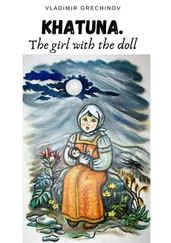They played Don Carlos, and broke up exhausted. The spare viola elicited no curses from its owner. It sounded tolerable this time, and anyway, it certainly wasn't at fault.
"Misha Korenev," thought Danilov, "was trying to master Paganini's abstruse riddles without the aid of a Stradivarius. He didn't have a Strad, only a simple factory-made violin... Now it doesn't matter to him... But all his suffering remains for us..."
The whole orchestra was talking about Korenev's suicide today. There were other people, besides Danilov, who had known Misha, and everybody was upset by the death of a musician. What had happened to Korenev they could only guess. Danilov and Korenev hadn't been close friends at the conservatory. In the past few years he had seen him perhaps three times, once at a concert, twice at the Maryinsky baths -- first in the steam room and later in line at the beer counter. They had had a conversation, which astonished Danilov and which he promptly forgot. Now he learned that Korenev knew Natasha.
The next day he did not attend the service and vacillated about going to the burial. He did not like funerals. But he went nevertheless. He could not locate Misha's grave right away, but when he saw a group of people in the cold birch grove, he headed that way and was not mistaken. There were a lot of people, most of them young. Misha lay tranquilly, his face distorted neither by suffering nor pain. It was as if he had died in his flight toward earth and had never touched the cruel stones of the sidewalk. A thin man with a pointy nose read someone's poetry. A woman of thirty, dressed in black, and two frightened girls stood by the coffin. Danilov saw many familiar musicians, some of whom nodded silently at him and others who merely slipped him a glance. Something made Danilov look around, and at a distance he saw Natasha standing by a green bench and weeping. Danilov was confused. It seemed indecent to approach Natasha now, so he went on standing with his back to her. Was she an apparition, he thought, or a human being?
They helped the widow up and led her from the cemetery. Then Natasha went to the snow-sprinkled grave and placed roses on the mound. The widow saw her, stopped, and seemed to want to go back, but then she grew still, and her friends led her to the gate.
Danilov waited for Natasha.
"Don't talk to me about anything today," Natasha said. "And don't see me home. But if you want, call me tomorrow, here's my number."
She handed Danilov a scrap of paper, turned quickly, and went past the gravestones and crosses down a path to the left, apparently to escape the notice of Korenev's widow.
At the cemetery gate Danilov approached the widow, and, excusing himself, handed her the white envelope he had received two days ago from Melekhin.
"What's this?" the widow asked, bewildered. She wasn't in full possession of her senses, and it was not clear to her what was happening at the moment.
"This, you know..." Danilov was embarrassed. "Your husband appeared at our institute, and this is the money we still owed him..."
"Who are you?" the widow asked.
"I'm a friend of Misha's," Danilov said. "I work at the institute ... at the club..."
"Thank you," the widow said. "Please come with us, we'll be eating and drinking to Misha's memory at our house..."
Danilov had no choice. He was happy that the widow had accepted the money and that the whole business, which had been worrying him all day, had gone smoothly without a hitch. The car turned off Prospect Mira before the Shcher-basky metro station and stopped in front of a white house with balconies that Danilov had never seen before. He slipped away from the group unnoticed.
"I think I'll go to the Maryinsky baths," Danilov decided. "They're nearby, and I'll have some beer, if I'm lucky." It was at the Maryinsky baths that he had spoken with Misha Korenev for the last time.
The baths had beer.
The dark bar, with mops and soap on the counter and a beer spigot reigning over all, was crowded. There were construction workers in greasy overalls, clerks from the hardware store, workers from Kalibr, you name it, they were there! The wrinkled, gray-haired woman bartender, known as Baba Zina, did not even wait for the foam to settle. Slapping down war veterans who tried to get to the head of the line, she kept shouting: "Mugs! Mugs! Boys, don't hold up mugs! I'll only serve people with buckets and jugs!"
Danilov pushed his way to a corner of the bar without spilling his beer onto the backs of the other customers, and put two mugs on the counter that ran around the room. Moving aside a newspaper covered with scraps of sausage and cheese, he drank one beer right away and sent the empty mug back to Baba Zina.
"Hey, you, got a shot glass?" Someone nudged Danilov in the ribs.
"What?"
"I said, have you got a shot glass?"
"No, I don't carry one with me," Danilov said angrily and turned to the wall.
"Misha and I stood right here a year ago," thought Danilov, "and somebody asked us for a glass. Maybe it was the same man.... And Misha said: 'Get a collapsible one.' "
Misha had been sad that day. He drank mug after mug of beer, but without enjoyment, almost not realizing that he was drinking. Danilov treated him to some fish -- Caspian roach, which even had the roe. But Misha kept staring into space, tugging at his bushy moustache, tugging so furiously he seemed to want to pull out a clump. The conversation was quiet at first, the kind that occurs between Moscow acquaintances who had not seen each other in a while. How are you, where are you working, what do you make, do you have children, what kind of an apartment, how are things going toward getting a car? Misha asked and answered himself, while Danilov sipped his beer and learned that things with Misha were great, he was making plenty of money. For several years in a row he had been touring in the East and North with small ensembles and a singer. He himself sang and played in the "Big Beat" style, and some months made as much as two thousand for that. So naturally he had a Zhiguli car and an apartment, and his two daughters and wife were well dressed. And suddenly Misha broke down. He shoved aside his beer mug abruptly, spilling the beer, and began speaking avidly, angrily, it didn't matter to whom, whether to Danilov or some other regular of the bar at the Maryinsky baths. "Enough, enough! Enough!" Misha said. "I've had enough of everything! Money, women, fun and games! It's all a shell, the cellophane wrapping. It's all a way of existing! But what about the existence itself? Where is it? Sooner or later we all come face to face with the essence of life, and then what are we? Nothing! And what is life? Life is passion, life is thirst. Passion and thirst for what you have taken to be your life's meaning. You know, Danilov, what my life's meaning is.... But I was afraid, afraid, afraid to take risks, afraid to take on more than I could handle, afraid that the burden would be too hard, afraid of sacrifice -- and so I betrayed... everything... I'm not a devout man, but the words of John the Divine astonished me: 'Love destroys fear... He who is afraid is imperfect in love...' You understand? I was afraid, easily making excuses for my fear, and I lived too easily. I was afraid and I was imperfect in my love -- for music, and for women, and for life. And now it's not that I don't love anything, it's simply that I hate myself, my life, my music! No, that's not right, I haven't stopped loving music completely yet... That's my last chance... I still might be able... Do you remember what Professor Vladimirsky used to say about my talent?" Danilov did not remember, but he nodded anyway. But Misha hadn't even needed the nod. He immediately went on to tell about going to a body-building coach. He was giving him special exercises for the muscles and ligaments of the shoulder, forearm, hands, and fingers. In the past few months Misha had almost achieved his goal. "Look!" Misha said. "Paganini's fingers and hands were longer, but I can compensate for that now because I have ..." However, Misha did not finish but gave Danilov a suspicious look, as if he were an informer, a sober fear appeared in his eyes, as if he were giving away a state secret. "Well, anyway," Misha said. "I have to be off now." And quickly, with a kind of buzzing sound, like a bumblebee, he left the bar of the Mar-yinsky baths. Only when he had reached the last step of the steep stairway leading up to the street -- which had the effect of placing him on a pedestal or in a pulpit -- did he yell to Danilov over the noise of the beer mugs, "Remember! He who is afraid is imperfect in love!" And he vanished.
Читать дальше












